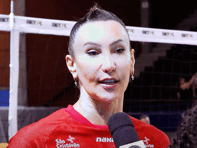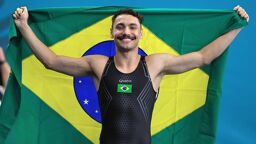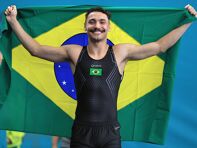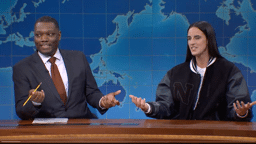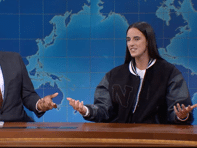(This article was published in 2002)
By: Eric Gumby Anderson
Editor’s Note: Derrick Peterson requested that Genre spell his name as “Déric” for this article.
“I joined the cross country team as a sophomore in high school because I looked at their traveling schedule and thought ‘cool they go places,” Déric Peterson, the US National 800 meter (half mile) champion, says. He had no idea just how far track and field would take him.
Today Peterson is one of America’s most prominent distance runners, recently winning the US National 2001 Indoor championships, two months ago in New York. Racing has taken him all over America, Europe, and even to China where he won the silver medal in the World University Games last summer.
Now, he’s coming out.
Ducking in and out of stores on his recent trip to Los Angeles, Déric was candid about his sexuality “I hate labels. I don’t really care what people think of my sexual orientation, I like men and women. One thing I will say for sure, I’m definitely not heterosexual!”
Déric’s post-modern notion of sexuality fits nicely into his laissez faire personality, his soft-spoken manner, and his subtle sense of humor; although it contrasts his fierce competitiveness and fury on the track. As an athlete, his dual personality is incongruent. “I have realized that my whole life I’ve just defied stereotypes. I guess it’s my calling.”
Defying stereotypes is something Déric does well. With two bachelors degrees and an MBA in progress from the University of Missouri, at the age of 23, he’s no dumb jock. Déric is confident, and he must be in order to come out publicly to the hyper-macho arena of sport, where homosexuality is a pariah, and careers balance on a blend of athleticism and corporate sponsorships. But his fury on the track is tempered by a sophistication usually found in those beyond his years, an urbanity exemplified in his clothing. He looks odd stepping out of his mud-drenched Land Rover wearing chic attire in Missouri, where he has lived and trained for the past 5 years. “I just love to see the look on peoples faces when they see that juxtaposition.”
Déric knew he wasn’t heterosexual prior to adolescence. He grew up in New York, and began patronizing gay clubs in the Village when he was just 14. He joined his high school cross country and track teams, and found that he liked running more for the mentor he found in his coach, than for the sake of winning races. “I wasn’t really all that good initially,” he said. “I even walked part of my first race. But my coach was just amazing, I learned more about life from him than anyone. I can’t thank him enough.”
So with the mentoring of a great coach, and “a hell of a lot of hard work” Déric ended up running a 1:54 half mile in high school – impressive enough by Georgia Standards to where his high school named Feb 12th Déric Peterson day – but not all that impressive in terms of national caliber prep 800 meter competition. In college Deric began to shine. He ran 1:48 his first year, and by his senior year he was an NCAA D.1Champion. Since then he has run 1:45.18
“I’ve got some good training partners with the guys I now help coach at Missouri, and I’m giving myself a few years to break the American record of 1:43. I’m also thinking of moving up to the 1500 meters, and plan on making the next Olympic team.”
Déric’s accomplishments on the track, combined with his willingness to come out publicly will make an enormous impact on the issue of gays in sport. Not just because Déric is the first professional track and field athlete to come out while competing; or that he is the first black athlete in American history to come out while still in the game, but because he did not lose his Adidas sponsorship. In fact, it was never even an issue with his sponsor, his agent, or his coach.
“I called Adidas and told them that I was thinking of doing this story for Genre, and coming out publicly, they said, ‘Great, that’s not a problem at all.’ They don’t care, its not like people are going run to the store to return their Adidas.”
To be sure, Déric’s coming out was likely nonchalant with his sponsor because track remains an individual sport. Team sports, and sports that require physical contact have been shown to be more homophobic than individual sports, so the possibility of an openly gay football, basketball, and baseball player coming out are made more difficult. Nonetheless, extreme homophobic statements by some NFL, MLB, and NBA athletes were met with strong public condemnation. This, combined with recent outings of athletes in other – more macho sports – like boxing, drag racing, and now track and field, suggests that the issue of professional athletes coming out is heading up the homophobia hierarchy. The support Déric has received from all involved, including his sponsor, suggests that perhaps the fear that professional team sport athletes have of losing their sponsorships may be ungrounded. Either way, it doesn’t matter to Déric. “I’m just going to go about being me, eating my favorite foods (Burger King), drinking my favorite drinks (Starbucks and Apple Martinis) and setting the track on fire.”
______________________________
This article was re-edited for posting on Outsports.com














